Kaiwen Wang
Learning the Mechanism of Catastrophic Forgetting: A Perspective from Gradient Similarity
Jan 29, 2026Abstract:Catastrophic forgetting during knowledge injection severely undermines the continual learning capability of large language models (LLMs). Although existing methods attempt to mitigate this issue, they often lack a foundational theoretical explanation. We establish a gradient-based theoretical framework to explain catastrophic forgetting. We first prove that strongly negative gradient similarity is a fundamental cause of forgetting. We then use gradient similarity to identify two types of neurons: conflicting neurons that induce forgetting and account for 50%-75% of neurons, and collaborative neurons that mitigate forgetting and account for 25%-50%. Based on this analysis, we propose a knowledge injection method, Collaborative Neural Learning (CNL). By freezing conflicting neurons and updating only collaborative neurons, CNL theoretically eliminates catastrophic forgetting under an infinitesimal learning rate eta and an exactly known mastered set. Experiments on five LLMs, four datasets, and four optimizers show that CNL achieves zero forgetting in in-set settings and reduces forgetting by 59.1%-81.7% in out-of-set settings.
BoxMind: Closed-loop AI strategy optimization for elite boxing validated in the 2024 Olympics
Jan 16, 2026Abstract:Competitive sports require sophisticated tactical analysis, yet combat disciplines like boxing remain underdeveloped in AI-driven analytics due to the complexity of action dynamics and the lack of structured tactical representations. To address this, we present BoxMind, a closed-loop AI expert system validated in elite boxing competition. By defining atomic punch events with precise temporal boundaries and spatial and technical attributes, we parse match footage into 18 hierarchical technical-tactical indicators. We then propose a graph-based predictive model that fuses these explicit technical-tactical profiles with learnable, time-variant latent embeddings to capture the dynamics of boxer matchups. Modeling match outcome as a differentiable function of technical-tactical indicators, we turn winning probability gradients into executable tactical adjustments. Experiments show that the outcome prediction model achieves state-of-the-art performance, with 69.8% accuracy on BoxerGraph test set and 87.5% on Olympic matches. Using this predictive model as a foundation, the system generates strategic recommendations that demonstrate proficiency comparable to human experts. BoxMind is validated through a closed-loop deployment during the 2024 Paris Olympics, directly contributing to the Chinese National Team's historic achievement of three gold and two silver medals. BoxMind establishes a replicable paradigm for transforming unstructured video data into strategic intelligence, bridging the gap between computer vision and decision support in competitive sports.
Towards Metric-Aware Multi-Person Mesh Recovery by Jointly Optimizing Human Crowd in Camera Space
Nov 17, 2025Abstract:Multi-person human mesh recovery from a single image is a challenging task, hindered by the scarcity of in-the-wild training data. Prevailing in-the-wild human mesh pseudo-ground-truth (pGT) generation pipelines are single-person-centric, where each human is processed individually without joint optimization. This oversight leads to a lack of scene-level consistency, producing individuals with conflicting depths and scales within the same image. To address this, we introduce Depth-conditioned Translation Optimization (DTO), a novel optimization-based method that jointly refines the camera-space translations of all individuals in a crowd. By leveraging anthropometric priors on human height and depth cues from a monocular depth estimator, DTO solves for a scene-consistent placement of all subjects within a principled Maximum a posteriori (MAP) framework. Applying DTO to the 4D-Humans dataset, we construct DTO-Humans, a new large-scale pGT dataset of 0.56M high-quality, scene-consistent multi-person images, featuring dense crowds with an average of 4.8 persons per image. Furthermore, we propose Metric-Aware HMR, an end-to-end network that directly estimates human mesh and camera parameters in metric scale. This is enabled by a camera branch and a novel relative metric loss that enforces plausible relative scales. Extensive experiments demonstrate that our method achieves state-of-the-art performance on relative depth reasoning and human mesh recovery. Code and data will be released publicly.
Value-Guided Search for Efficient Chain-of-Thought Reasoning
May 23, 2025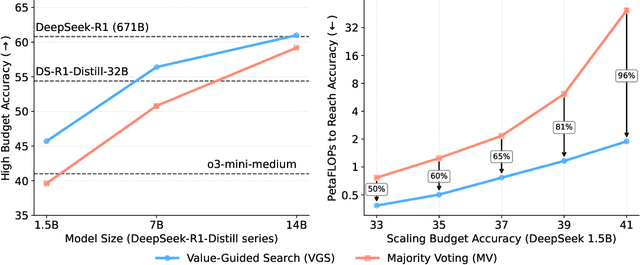


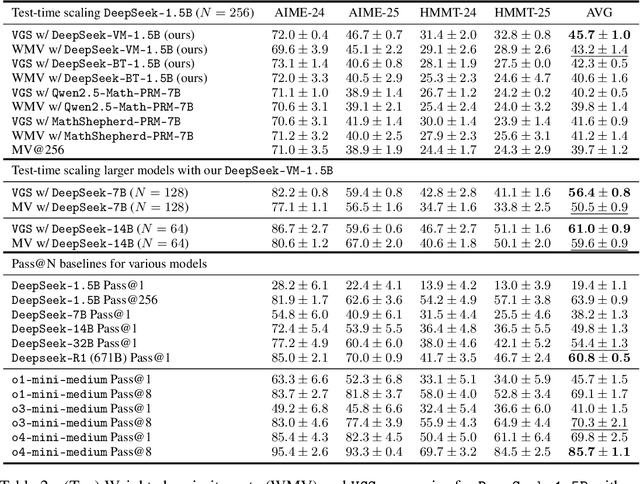
Abstract:In this paper, we propose a simple and efficient method for value model training on long-context reasoning traces. Compared to existing process reward models (PRMs), our method does not require a fine-grained notion of "step," which is difficult to define for long-context reasoning models. By collecting a dataset of 2.5 million reasoning traces, we train a 1.5B token-level value model and apply it to DeepSeek models for improved performance with test-time compute scaling. We find that block-wise value-guided search (VGS) with a final weighted majority vote achieves better test-time scaling than standard methods such as majority voting or best-of-n. With an inference budget of 64 generations, VGS with DeepSeek-R1-Distill-1.5B achieves an average accuracy of 45.7% across four competition math benchmarks (AIME 2024 & 2025, HMMT Feb 2024 & 2025), reaching parity with o3-mini-medium. Moreover, VGS significantly reduces the inference FLOPs required to achieve the same performance of majority voting. Our dataset, model and codebase are open-sourced.
$Q\sharp$: Provably Optimal Distributional RL for LLM Post-Training
Feb 27, 2025



Abstract:Reinforcement learning (RL) post-training is crucial for LLM alignment and reasoning, but existing policy-based methods, such as PPO and DPO, can fall short of fixing shortcuts inherited from pre-training. In this work, we introduce $Q\sharp$, a value-based algorithm for KL-regularized RL that guides the reference policy using the optimal regularized $Q$ function. We propose to learn the optimal $Q$ function using distributional RL on an aggregated online dataset. Unlike prior value-based baselines that guide the model using unregularized $Q$-values, our method is theoretically principled and provably learns the optimal policy for the KL-regularized RL problem. Empirically, $Q\sharp$ outperforms prior baselines in math reasoning benchmarks while maintaining a smaller KL divergence to the reference policy. Theoretically, we establish a reduction from KL-regularized RL to no-regret online learning, providing the first bounds for deterministic MDPs under only realizability. Thanks to distributional RL, our bounds are also variance-dependent and converge faster when the reference policy has small variance. In sum, our results highlight $Q\sharp$ as an effective approach for post-training LLMs, offering both improved performance and theoretical guarantees. The code can be found at https://github.com/jinpz/q_sharp.
Divide and Merge: Motion and Semantic Learning in End-to-End Autonomous Driving
Feb 11, 2025



Abstract:Perceiving the environment and its changes over time corresponds to two fundamental yet heterogeneous types of information: semantics and motion. Previous end-to-end autonomous driving works represent both types of information in a single feature vector. However, including motion tasks, such as prediction and planning, always impairs detection and tracking performance, a phenomenon known as negative transfer in multi-task learning. To address this issue, we propose Neural-Bayes motion decoding, a novel parallel detection, tracking, and prediction method separating semantic and motion learning, similar to the Bayes filter. Specifically, we employ a set of learned motion queries that operate in parallel with the detection and tracking queries, sharing a unified set of recursively updated reference points. Moreover, we employ interactive semantic decoding to enhance information exchange in semantic tasks, promoting positive transfer. Experiments on the nuScenes dataset show improvements of 5% in detection and 11% in tracking. Our method achieves state-of-the-art collision rates in open-loop planning evaluation without any modifications to the planning module.
Adversarial Attacked Teacher for Unsupervised Domain Adaptive Object Detection
Aug 18, 2024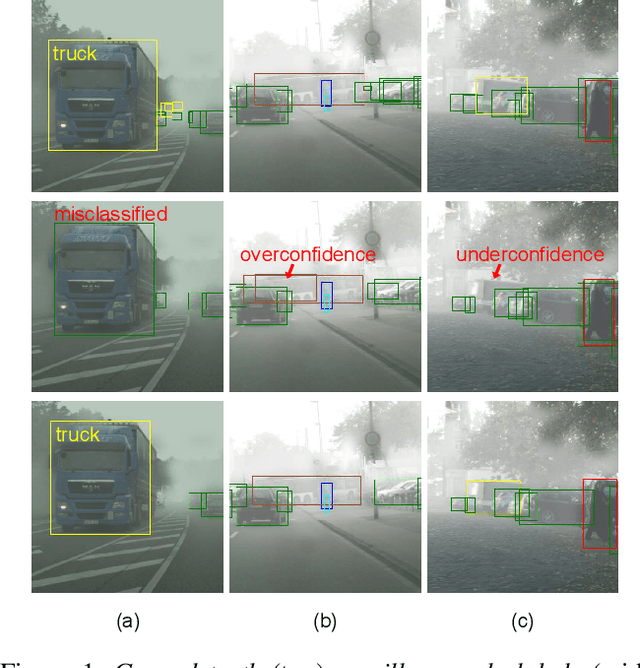
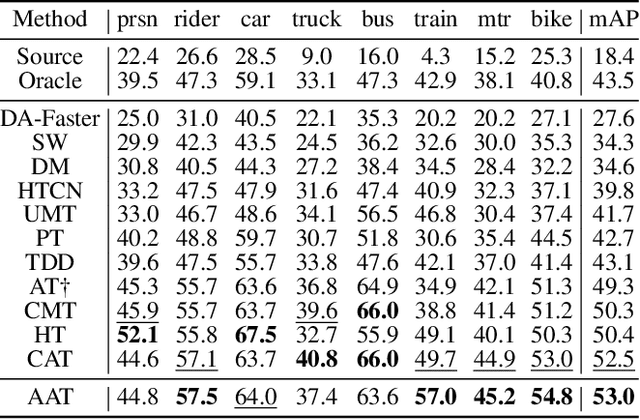
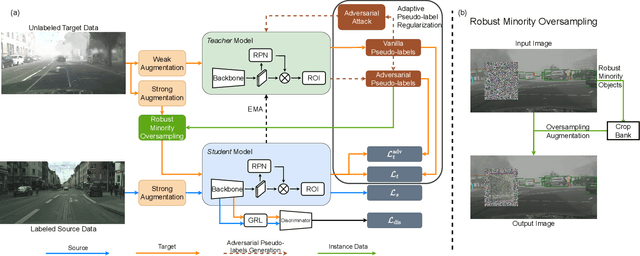

Abstract:Object detectors encounter challenges in handling domain shifts. Cutting-edge domain adaptive object detection methods use the teacher-student framework and domain adversarial learning to generate domain-invariant pseudo-labels for self-training. However, the pseudo-labels generated by the teacher model tend to be biased towards the majority class and often mistakenly include overconfident false positives and underconfident false negatives. We reveal that pseudo-labels vulnerable to adversarial attacks are more likely to be low-quality. To address this, we propose a simple yet effective framework named Adversarial Attacked Teacher (AAT) to improve the quality of pseudo-labels. Specifically, we apply adversarial attacks to the teacher model, prompting it to generate adversarial pseudo-labels to correct bias, suppress overconfidence, and encourage underconfident proposals. An adaptive pseudo-label regularization is introduced to emphasize the influence of pseudo-labels with high certainty and reduce the negative impacts of uncertain predictions. Moreover, robust minority objects verified by pseudo-label regularization are oversampled to minimize dataset imbalance without introducing false positives. Extensive experiments conducted on various datasets demonstrate that AAT achieves superior performance, reaching 52.6 mAP on Clipart1k, surpassing the previous state-of-the-art by 6.7%.
Conditioned Language Policy: A General Framework for Steerable Multi-Objective Finetuning
Jul 22, 2024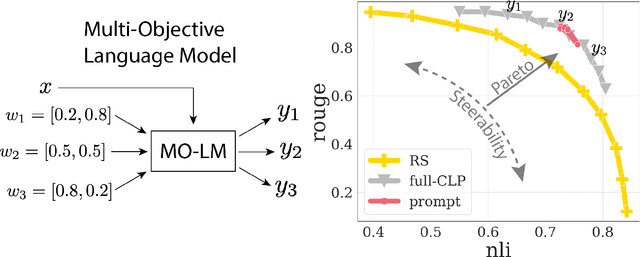
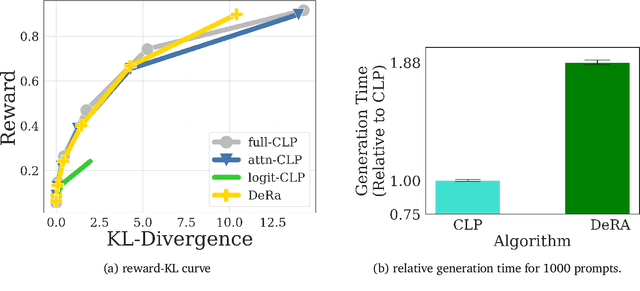
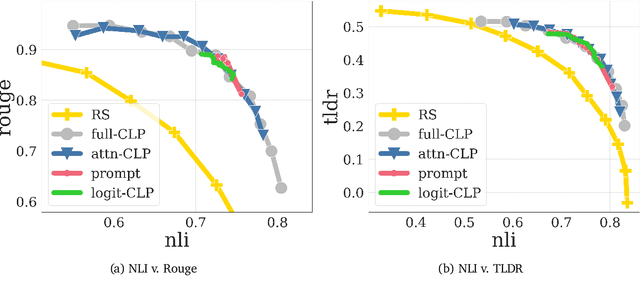
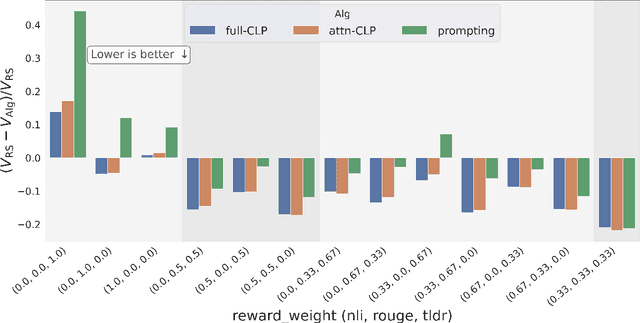
Abstract:Reward-based finetuning is crucial for aligning language policies with intended behaviors (e.g., creativity and safety). A key challenge here is to develop steerable language models that trade-off multiple (conflicting) objectives in a flexible and efficient manner. This paper presents Conditioned Language Policy (CLP), a general framework for finetuning language models on multiple objectives. Building on techniques from multi-task training and parameter-efficient finetuning, CLP can learn steerable models that effectively trade-off conflicting objectives at inference time. Notably, this does not require training or maintaining multiple models to achieve different trade-offs between the objectives. Through an extensive set of experiments and ablations, we show that the CLP framework learns steerable models that outperform and Pareto-dominate the current state-of-the-art approaches for multi-objective finetuning.
Efficient and Sharp Off-Policy Evaluation in Robust Markov Decision Processes
Mar 29, 2024Abstract:We study evaluating a policy under best- and worst-case perturbations to a Markov decision process (MDP), given transition observations from the original MDP, whether under the same or different policy. This is an important problem when there is the possibility of a shift between historical and future environments, due to e.g. unmeasured confounding, distributional shift, or an adversarial environment. We propose a perturbation model that can modify transition kernel densities up to a given multiplicative factor or its reciprocal, which extends the classic marginal sensitivity model (MSM) for single time step decision making to infinite-horizon RL. We characterize the sharp bounds on policy value under this model, that is, the tightest possible bounds given by the transition observations from the original MDP, and we study the estimation of these bounds from such transition observations. We develop an estimator with several appealing guarantees: it is semiparametrically efficient, and remains so even when certain necessary nuisance functions such as worst-case Q-functions are estimated at slow nonparametric rates. It is also asymptotically normal, enabling easy statistical inference using Wald confidence intervals. In addition, when certain nuisances are estimated inconsistently we still estimate a valid, albeit possibly not sharp bounds on the policy value. We validate these properties in numeric simulations. The combination of accounting for environment shifts from train to test (robustness), being insensitive to nuisance-function estimation (orthogonality), and accounting for having only finite samples to learn from (inference) together leads to credible and reliable policy evaluation.
Adversarial Defense Teacher for Cross-Domain Object Detection under Poor Visibility Conditions
Mar 23, 2024
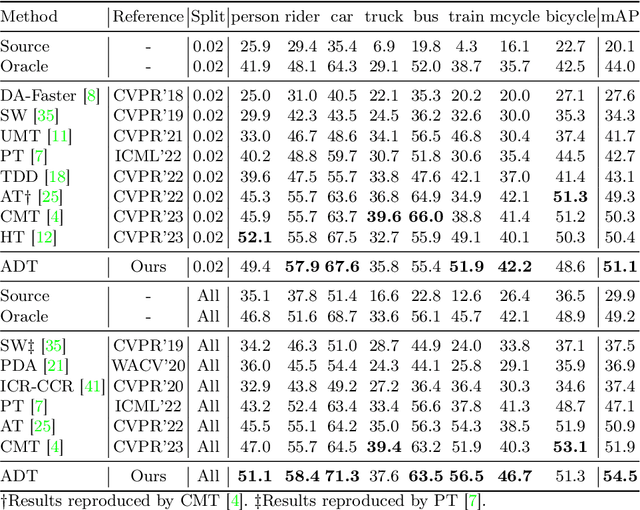
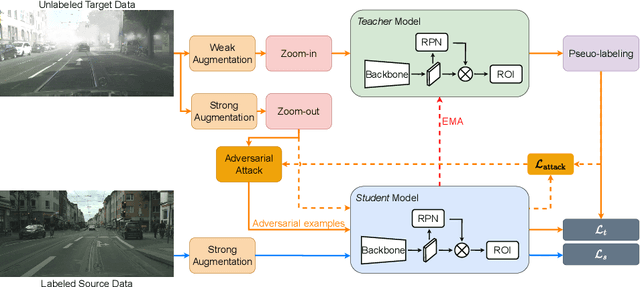
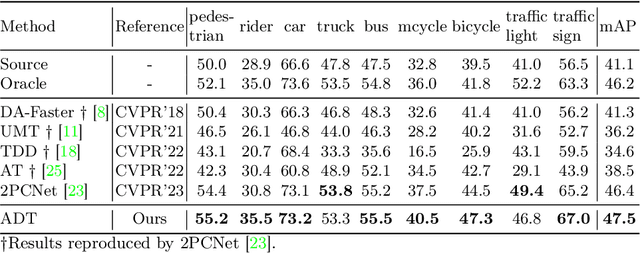
Abstract:Existing object detectors encounter challenges in handling domain shifts between training and real-world data, particularly under poor visibility conditions like fog and night. Cutting-edge cross-domain object detection methods use teacher-student frameworks and compel teacher and student models to produce consistent predictions under weak and strong augmentations, respectively. In this paper, we reveal that manually crafted augmentations are insufficient for optimal teaching and present a simple yet effective framework named Adversarial Defense Teacher (ADT), leveraging adversarial defense to enhance teaching quality. Specifically, we employ adversarial attacks, encouraging the model to generalize on subtly perturbed inputs that effectively deceive the model. To address small objects under poor visibility conditions, we propose a Zoom-in Zoom-out strategy, which zooms-in images for better pseudo-labels and zooms-out images and pseudo-labels to learn refined features. Our results demonstrate that ADT achieves superior performance, reaching 54.5% mAP on Foggy Cityscapes, surpassing the previous state-of-the-art by 2.6% mAP.
 Add to Chrome
Add to Chrome Add to Firefox
Add to Firefox Add to Edge
Add to Edge